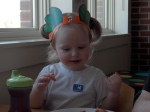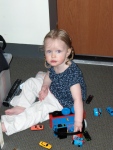 Heart Warriors was officially released on April 10th of 2012. It was entirely a coincidence that the book actually starts on April 10 of 2006. The beginning of the first chapter ends on April 12, 2006, seven years ago today.
Heart Warriors was officially released on April 10th of 2012. It was entirely a coincidence that the book actually starts on April 10 of 2006. The beginning of the first chapter ends on April 12, 2006, seven years ago today.
April 12th will never be an easy day for me. It was the only part of the book I found impossible to write in past tense. Those memories were ingrained in all of our hearts with scalpel and saw, sutures and suction. Today Liam and Moira had no school. To repeat history, Moira threw up a ton yesterday just like she did seven years ago. . . But today I don’t have two babies in diapers, and I didn’t spend April 8th of this year with both of my children in the hospital, so things are looking way up compared to seven years ago.
Liam is looking forward to his tenth birthday and is highly enamored with video games. Thomas and His Friends are tucked away in a drawer in our living room like Woody & co. from Toy Story, and life has moved rapidly forward from the point where it paused on a precipice seven years ago.
For the anniversary of Heart Warriors and the anniversary of Liam’s life being spared – here is the first chapter, an excerpt from the book (this feels like cheating since I usually have to put more time into a blog post) and some little surprises at the end:
1
In the Thick of It
Denver Children’s Hospital, Cardiac Intensive Care Unit (CICU),
Mon. Apr. 10, 2006, 9:30 P.M.:
Liam won’t sleep. He won’t eat. He won’t calm down. He’s almost three, but his whining has morphed from the standard toddler protestations to preternatural whale-song. Liam had his fourth open-heart surgery five days ago, but despite his exhaustion, he won’t sleep. His lungs are full of fluid, so I force my son to walk.
“No, Mommy, Liam no walk,” he weeps.
His tears tear me apart. I want to weep, but I will not cry in front of Liam. Instead I negotiate. “Sweetie-pie, if you walk three laps around the unit, Nurse Maggie will let you pick a prize out of the treasure box.”
He peers in the cardboard box Maggie is holding and spies the tell-tale blue of a Thomas the Tank Engine push and go toy. “Liam want Thomas.”
“You can have Thomas when we make it all the way around, three times. Let’s chase Thomas! Let’s count to three!” I try to sell my son an adventure instead of a chore. But it is a chore.
Before Liam can leave his bed Maggie unhooks his saline drip from the dancing rack above his bed and moves it to a rolling pole while I pop the oxygen tube off the wall-mount behind his bed and squeeze it onto the nozzle of the portable tank. As I drop the side-rail of Liam’s crib, Maggie double-checks the oxygen gauge and hooks the tank to the IV pole. Before Liam can stand, Maggie clamps the bulbs at the end of each of his three chest tubes to his diaper. The bulbs catch the fluid that drains from his lungs. They now rest at his hip like plastic grenades and quickly fill with bubbling pink fluid as my son sits on the edge of the bed.
Maggie checks to make sure all of Liam’s lines, oxygen, pacemaker, IV drip, and chest tubes won’t catch on the bed rails, and together we scoop him off of the bed and stand him gently on the floor. I feel like Herr Drosselmeyer propping up a dancing doll.
After we turn out of Liam’s semi-private room, Maggie sets the train on the floor and pushes Thomas’ funnel so the toy will zoom ahead of us. Holding both our hands, Liam struggles, step by step, to follow Thomas. Maggie drags the oxygen tank and IV pole behind us while I grasp the portable pacemaker in my right hand that is tethered to my child’s heart.
As Liam staggers after Thomas, he sees babies in their cribs and wrests his hand free from mine to wave. In his sweet voice, still scratchy from the ventilator tube, he croaks “Hi, baaabies!” to every broken-hearted child we pass.
We make it two and a third laps before Liam is shaking.
I scoop him in my arms and take the shortcut through the break room with Maggie and the equipment trailing us like a bridal train. I deposit my son back in his bed and Maggie and I perform our ritual of repositioning all the lines and bulbs and bags where they belong before she strips the chest tubes and drains the fluids.
Physically spent, Liam doesn’t care about his toy anymore. Despite his exhaustion, he whines and refuses sleep. He’s so tired.
We are all so tired.
At least Maggie gets to go home eventually.
CICU, Tuesday, April 11, 1:00 am:
Liam won’t sleep, but I’m beyond exhaustion. One of the nurses offers me the dark silence of the bereavement and family counseling room. For twenty minutes I attempt to unwind on the tiny loveseat but never attain sleep. The nurse comes back into the dark room to clear me out. They need the space for a family en route on the flight-for-life helicopter. Another dying baby will be here soon with its new parents, and I retreat to my narrow reclining chair at Liam’s bedside.
I’m an old parent with my walking talking son. I’m the veteran on this battlefield. Liam is supposedly recovering, but after almost a week in the intensive care unit I’m unsure we’re going anywhere but in circles.
I haven’t slept more than two hours for more than three days. Every time I think Liam is asleep, I lean back in the chair, and he whines, “Mommy, come here.” This happens over, and over, and over again. Finally, I burst out of the CICU just after 2:00 A.M. and walk, unescorted, back to my room at the Ronald McDonald House (RMH). I’m too ashamed to wait for the security guard. I’m ashamed because I’m supposed to stay. I’m on night duty. It’s my duty as Liam’s mother to stay, to wait, to never leave him alone. But I’m so sleep deprived I can’t function. I can’t stay, and I hate myself for leaving. Even when I get back to a quiet bed, I won’t sleep because I burn with guilt for leaving Liam awake and alone.
I didn’t know it at the time, but as I crossed that dark street alone a notorious rapist was one block over committing a crime spree as I stomped between the hospital and the Ronald McDonald House. He stayed off my street. I’m just lucky, I guess.
CICU Tues. April 11, 2006, 8:00 P.M.:
Jim sat with Liam all day. I’m on the night shift. Liam’s bed got moved to the less intensive side of the Intensive Care Unit. Progress?
Our new bedside neighbor is dying. I know this because Jim and our daughter Moira ate dinner with Charlie’s family at the Ronald McDonald House. Charlie is fifteen months old. His mother asked the charge nurse to press his hands in clay tonight while she prepared her older children.
Charlie will go home for hospice care this week. His parents prefer their son’s death to happen at home. They only get to choose the venue. The event is beyond all control.
I won’t cry for Charlie in front of Liam. Instead I sneak off to the quiet bathroom upstairs to sob privately. I can’t stand to sit next to that dying baby right now.
When I return, Liam and I walk again. Liam whines. Liam weeps. He doesn’t understand that I’m trying to walk him home, willing him to heal by walking. I’m trying to convince my child to “walk it off,” but it’s open-heart surgery, not a cramp.
Walking it off fills the bulbs again, but it’s not getting us anywhere but back to bed. Liam cringes as tonight’s nurse tugs and strips the standing fluid from the tubes that are stitched into his skin.
We have a routine to distract him. “Tell it goodbye, Liam.”
“Bye-bye juice.”
Liam’s lungs just keep producing juice, and he keeps telling it goodbye. All of that juice filling those little grenades is what keeps us here. When the nurse is done stripping the tubes, she drains the grenades, measures the juice, and takes it away, but we remain. We are standing water that will not evaporate. We are the juice.
“Liam hurts,” he whines and leans back into bed. He won’t play with his Bob the Builder toys. He doesn’t want any stories, not even his favorites James and the Red Balloon or Thomas and the Jet Engine. He has stopped loving the things that make him Liam.
He still will not sleep. None of us will sleep. We’re in the ward now, and I don’t have the reclining chair anymore. I sit stock straight in a rolling desk chair and wait for Liam to fall asleep, but he refuses.
Under this dirty florescent light time is irrelevant. All these children have lost their sense of time, and my own failing ability to grasp the meaning and measurement of time is what separates me from the other adults. I am neither nurse nor patient. I am a phantom observing everything, but barely participating. I am the scenery and a bystander as Liam and I drift further from our sense of self.
Behind me, Charlie plays with a toy in his crib. He doesn’t realize he is dying. I can’t stop realizing that the rising tide of death just one bed over is drowning me tonight.
Charlie is blond like Liam, only Liam’s skin is sky blue because his heart and lungs are so inefficient. He is always short of oxygen. Charlie’s skin is the color of summer corn because his liver and kidneys failed. He is swaddled in those familiar purple hospital pajamas that Liam just outgrew.
Charlie was made to wait too long for a heart transplant. Now he has a dead baby’s good heart, and every good thing Charlie was born with is now broken. I turn away and burn with guilt because I don’t have the strength to watch this child die. I can do nothing right by these boys, so at midnight I head back to the Ronald McDonald House with the security guard. I try to sleep, but I lay in bed and think of Liam and Charlie.
Denver Ronald McDonald House, Wed. April 12, 2006, 7:30 am:
Jim left to sit with Liam. I stay in bed, armed with the remote and let Moira watch far too much Disney Channel in her Pack and Play. I’m so tired, and I love The Wiggles for letting me sleep. Around nine o’clock I drag myself out of bed to get my poor child breakfast and change her sopping diaper. Moira will be two in June, but she seems so much older in this place.
Three days ago both of my kids were patients at Children’s Hospital. Moira was in the emergency room on Sunday with rota-virus after thirty-two hours of retching in the small Ronald McDonald House guestroom. I asked Jim’s mom Karen to bring Febreeze to kill the smell, but it’s Wednesday and our room still stinks. I did nonstop laundry for two days, and I didn’t sleep.
Today Moira eats dry Cheerios in the communal dining room and drinks a cup of milk for the first time since Friday. Jim rushes in, upset that I wasn’t in our guestroom to answer the phone. I’m so confused.
“I’ve been trying to call you. Liam needs another surgery!” he pants because he ran here from the hospital and up three flights of stairs.
As Jim bends to catch his breath, I sigh, “Oh shit . . . oh shit.”
Jim tells me that Esther, our surgical nurse, discovered Liam’s sternum separated in its steel wires, like sticks bound in twine shifted out of place. All I can see is me marching Liam in staggering laps as his ribs floated loose in all that juice. My child was literally sawed in half, and I, like a war criminal, made him march.
I return to the hospital while Jim stays with Moira.
CICU, Wed. April 12, 2006, 10:00 am:
When I walk in the CICU, I pull back the curtain around Liam’s bed. He is delirious and begs the phantom over his bed to take him away to the Island of Sodor to play with Thomas the Tank Engine. Maybe that’s his idea of heaven. Maybe he just wants to be Liam again.
Liam doesn’t know I’m there. I wish he would say, “Mommy, come here.”
Instead, he just whimpers. His wound from the last open-heart surgery seven days ago weeps a clear liquid, like tears, but sticky. Jillayne, our day nurse, takes cultures.
I call Liam’s grandparents from the hallway. Someone has to take Moira, again.
Liam and I hang on this trapeze for hours. My son twists in his delirium and pain, and I swing over him, rubbing his forehead, hoping to catch him before he falls away entirely. We know surgery is imminent, but before Liam slipped away to play with Thomas in his mind, Jim convinced him to take a few bites of a Rice Krispie treat. Liam wouldn’t eat for two days. That huge accomplishment has delayed surgery by five hours.
Finally, another cardiac anesthesiologist comes to me with another clipboard, and I sign Liam’s life over for the ninth time since he left my body thirty-five months ago. The world-class surgeon, Dr. Lacour-Gayett, appears from nowhere, leans into the bed, rubs Liam’s cheek and murmurs, “I’m so sorry, I’m so sorry,” in a soft fatherly voice.
It’s as if I’m not there with them, and I’ve never heard anything more terrifying than that Frenchman’s whispered apology.
I’m shutting down.
Liam can’t stop cringing and whimpering. The pain of his separating chest is tearing him from his dreams, burning off the cloud of drugs. At my insistence, the attending doctors have doped him up all day with double the opiates recommended for a thirty-pound child. But my small son still whimpers. There aren’t enough drugs in the world to make the hurt stop, so Liam sounds like a dog struck by a car, each breath literally rattles his bones and stops my heart cold.
I shut down a little more. I am a fading light, but I won’t leave Liam’s side until we reach the operating room doors. Then Liam is gone. It is 5:00 P.M.
Denver Children’s Hospital, Surgical Waiting Room, Wed. April 12, 2006, 7:30 P.M.:
The cafeteria is closed. Jim and I ordered Chinese takeout. We eat beef and broccoli and sesame chicken in the waiting room as the sky slowly darkens the windows.
My mom took Moira an hour before the surgical team took Liam back to the OR. Jim and I are childless again.
All the familiar strangers went home for the day. The TV that runs all day every day is finally silent, and the white-haired ladies in blue smocks that staff the desk took their knitting home for the night.
So many long hours on so many different days of Liam’s life, Jim and I camped out in this room waiting for our son. During the day, we can look out and see the older part of the hospital that houses the administrative offices, the valet parking circle, and a blue letterbox. Tonight, I only see my pale face, distorted by the strange and silent darkness, as this room loses its familiarity. A child’s heart surgery is not meant to happen at night.
Denver Children’s Hospital, Surgical Waiting Room, Wed. April 12, 2006, 10:00 P.M.:
Before they rolled Liam back to the operating room, the surgical fellow, Dr. Kosic, told me it would take forty-five minutes to reset Liam’s sternum. It’s been five hours.
All day long the docs and nurses kept saying, “No fever. Can’t be an infection. No fever.”
According to Dr. Lacour-Gayet, it was an infection, an infection so deep and so violent that another ninety minutes and a bomb would have detonated and all my worst fears manifested. It takes an adult one minute to circulate all the blood in his body. Liam weighed thirty-two pounds the week before, so maybe fifteen or twenty seconds after the sternum infected his heart was all the time required for his heart to pump septic blood to every vessel in his being.
Ninety minutes and thirty seconds from an ending to a life just shy of three years. I would have had the bereavement room for the remainder of our stay. No new parent could dislodge me, only the coroner, only the end of the road. But thanks to Esther, Liam’s story goes on. She caught it just in time before my son’s skin and bones poisoned his heart and blood with two strains of staph and one strain of strep.
Dr. Lacour-Gayet, assisted by Dr. Kosic, struggles to find the right English word to describe Liam’s tattered sternum. He turns and looks at her, shrugs, then settles on, “ratty.” The inside edges of our son’s dissected sternum were left ratty from the infection that chewed apart his bone from inside the wound. So, Dr. Lacour-Gayet stripped the dead tissue down to healthy bone before irrigating Liam’s heart and chest cavity and resetting the whole mess. The process was so violent that the thoracic duct and lining between Liam’s digestive tract and lungs was ruptured and will seep fat for months while he loses more weight.
The surgeon’s description is clinical. He is direct. He offers us words we shouldn’t know but we recognize, “corrupted,” “necrosis,” “dislodged,” and “infection.” These words are sterile, but his tone seems nervous, almost giddy.
Then this world-class, super confident, nerves-of-steel, Parisian heart surgeon who saves babies’ lives for a living says the words that will ring in my ears for the rest of my life, “We were so lucky.”
Anything that was left of my conscious presence in the room has left the building, the city of Denver, and the state of Colorado. I am gone. My real self might have been an astral projection atop a mountain in Utah, but I have checked out. It will be years before I come back to this moment. It will be years before I cry.
I spend the rest of the night babbling to the cadre of nurses and Dr. Kosic about our childbirth experiences. I desperately pretend that all this intense attention on my son doesn’t mean what it clearly means. I pretend that this surgeon really wants to shoot the breeze instead of owning that she’s standing vigil over my son whose chest she just closed. I pretend this wasn’t a major heart surgery because I never saw this one coming. Tonight I willfully deny how close we came, how close we still were to Liam’s death, and the manifestations of my fears. The threat has not passed, and it’s too soon to open my eyes.
CICU, Thurs. April 13, 2006, 9:00 am:
Liam wakes with six chest tubes shoved into his torso. By noon, the attending doctor will clear the room and cut another star shape with a scalpel for a seventh tube because Liam’s right lung collapsed. The nurses pronounce Liam a chest tube record holder, but there’s no blue ribbon for that.
To understand these chest tubes, imagine a masked man took a scalpel and slit seven x’s under your ribs and then shoved a garden hose in each hole, pushing each hose until it made contact with a vital organ. Then the hose is literally sewn into your skin to keep in place.
Liam’s old chest tube holes, the ones that were there the night before, were cut out, stripped of infected skin and sewn shut. The old holes pucker like the gathered openings of drawstring bags, sprouting little black stitches like purse strings. The skin around Liam’s old sternal incision was cut away like the ratty parts of his bone.
For the first time in the five times Liam’s chest has been spread open, he sports primitive Frankenstein’s monster stitches instead of the clever inward stitching that leaves a fine white line. These sutures tug at Liam’s skin and leave an even pattern of horizontal white ticks down his chest that he will wear for the rest of his life, however long that might be. Seven tubes, eleven holes, thinned out bone, Frankenstein’s whipstitches, and my child is more disfigured than ever, but he’s not dead.
Liam is not dead today, so I cannot complain.
He is so small. He’s a little teapot spouting hoses draining blood, water, and fat. Liam is wretched. Jim and I are wretched. Moira is playing with her cousins, unaware that her brother almost died last night. I’ll get her back on Friday. I won’t let her be away from me this time.
Liam and I will not walk together for weeks. When he finally walks again, he has trouble with muscle control from being immobile for four weeks, so I walk no farther than the bathroom or to tag team Jim so I can take over with Moira at the Ronald McDonald House.
For five long weeks, Jim and I are tethered to Liam’s bed, passing each other in the orbit of the Children’s Hospital to exchange Moira for Liam and Liam for Moira. We are a satellite family, never coming together.
Home, Thurs. May 3, 2006, 4:00 P.M.:
We finally bring Liam home for good. We went home a week ago, the day before his third birthday, but he was quickly readmitted for too much fluid on his lungs. He marched right back to his bed in the Step-Down unit, as if he had never been home.
At home a PICC line runs super antibiotics through Liam’s left arm straight to his damaged heart. A special diet keeps fat out of his lungs, an oxygen cannula up his tiny nose keeps those lungs inflated, a triple adult dose of diuretics keeps the same lungs dry. I’m not quite sure what spark of resolve keeps Liam alive, but I am in awe of my son.
It took almost five weeks of extraordinary measures, not the three we expected. It took five open-heart surgeries to keep Liam alive for three full years, not the three we expected. I will never promise my child anything. I don’t dare. I have lost all sense of expectation.
All that remains is hope.
(C) 2012 – Amanda Rose Adams, A Behler Publications Book
Want more? If you would like a chance to win a signed copy of the book (USA only for shipping), post a comment below. I’ll randomly select a winner on Liam’s birthday at the end of April, 2013.










